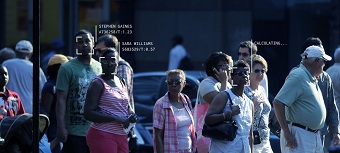An agreement announced between Disque Denúncia in Rio and Facewatch Latin American distributor, Staff of Technology Solutions, will enable the state’s most dangerous criminals to be automatically recognised when they pass through facial recognition cameras linked to the Facewatch system.
The announcement of the partnership with the Disque Denúncia took place at the official residence of the British Consul General in Rio, Simon Wood, bringing together experts in the subject. This is the first agreement in Latin America of a non-governmental organisation with Disque Denúncia for the use of facial recognition technology. “With state-of-the-art technology to help us, we will optimise resources and be more able to generate intelligence to combat crime” said the coordinator of the Denúncia dialogue, Zeca Borges.
From January to November last year Disque Denúncia says 448 people were arrested and 358 indicted, in addition to hundreds of heavy weapons, ammunition and explosives taken from criminals. Since its founding 23 years ago, almost 3 million reports have been filed with the confidential Disque Denúncia service. The COO of Staff of Technology Solutions in Rio, Matheus Torres, announced that there are already facial recognition cameras linked to Facewatch in three shopping malls in the capital, as well as commercial buildings. Recently, a trafficker sought by Disque Denúncia was recognised by the system and arrested by security forces.
Thiago Pampurre, Security Coordinator, Norte Shopping, Rio, said “Facewatch has reduced the number of incidents from six a day to one in just five months. We believe the Norte Shopping Centre is now the most protected shopping centre in Rio.” The British Consul, Simon Wood, said “We have many years of experience with surveillance cameras in London. Freedom is very important to us and there is a strong system of laws to ensure the anonymity of people who have not been involved in crime”. The Facewatch system has been designed to protect the privacy of individuals and comply with the highest standards of security and data protection. In the UK it is used to prevent volume crime such as shoplifting rather than the more serious crimes dealt with in Brazil.








